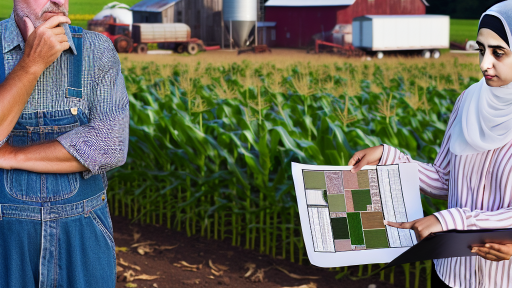Understanding the Basics of International Agricultural Laws
What Are International Agricultural Laws?
International agricultural laws govern trade and policies related to agriculture.
They create a framework for countries to promote fair trade practices.
These laws aim to protect food safety and animal welfare globally.
Importance of Compliance
Complying with these laws is crucial for global agricultural sustainability.
It helps prevent trade disputes between nations.
Moreover, adherence fosters goodwill and strengthens international relations.
Key Components of Agricultural Laws
Several components comprise international agricultural laws.
These include trade agreements, environmental regulations, and safety standards.
Each component addresses specific challenges faced by the agriculture sector.
Understanding Trade Agreements
Trade agreements dictate how countries exchange agricultural goods.
These agreements set tariffs, quotas, and export limitations.
They aim to enhance trade and reduce barriers across borders.
Environmental Regulations
Environmental regulations protect natural resources in agricultural practices.
They promote sustainable practices to ensure long-term viability.
Governments implement these regulations to mitigate environmental impacts.
Transform Your Agribusiness
Unlock your farm's potential with expert advice tailored to your needs. Get actionable steps that drive real results.
Get StartedSafety Standards
Safety standards ensure that food products are safe for consumers.
These standards cover food hygiene, pesticide use, and animal health.
Compliance protects public health and enhances consumer confidence.
Global Organizations Involved
Several global organizations play key roles in agriculture laws.
The Food and Agriculture Organization (FAO) promotes food security.
World Trade Organization (WTO) addresses trade issues among countries.
These organizations provide guidance and support for compliance.
Implications of International Agricultural Laws
Understanding international agricultural laws is essential for every stakeholder.
Farmers, exporters, and policymakers must stay informed.
Being aware leads to responsible practices and promotes global cooperation.
Key Organizations and Agencies Governing Agricultural Compliance
International Organizations
The Food and Agriculture Organization (FAO) leads global efforts to defeat hunger.
FAO develops guidelines and standards for agricultural practices worldwide.
Another significant body is the World Trade Organization (WTO).
WTO regulates trade policies that affect agriculture, ensuring fair trade practices.
Regional and National Agencies
The European Union (EU) has strict regulations governing agricultural standards.
Members must comply with these regulations to maintain market access.
In the United States, the Department of Agriculture (USDA) sets national policies.
USDA oversees matters related to farming, food quality, and safety.
Environmental Protection Agencies
Environmental agencies monitor agricultural impacts on ecosystems.
The Environmental Protection Agency (EPA) in the U.S. ensures compliance with environmental laws.
These organizations often collaborate with agricultural entities for sustainable practices.
Local Agricultural Bodies
Many countries have local agricultural boards or councils.
These bodies enforce regional regulations tailored to local conditions.
Local boards often provide resources and education to farmers.
Showcase Your Farming Business
Publish your professional farming services profile on our blog for a one-time fee of $200 and reach a dedicated audience of farmers and agribusiness owners.
Publish Your ProfileThis support helps promote compliance with legal standards.
Industry Associations
Various industry associations advocate for farmers’ rights and interests.
They often work to influence agricultural policy and regulations.
Membership can provide farmers with vital information about compliance requirements.
Associations like the National Farmers Union offer resources and training.
Step-by-Step Guide to Assessing Your Farm’s Compliance Needs
Identifying Applicable Regulations
Start by researching the international agricultural laws relevant to your farm.
Focus on regulations that govern food safety, animal welfare, and environmental protection.
Utilize online resources from agricultural agencies and legal databases for accurate information.
Consider consulting with legal experts or compliance specialists to clarify complex laws.
Evaluating Current Compliance Status
Conduct a thorough assessment of your existing farming practices.
Compare your operations against the identified regulations.
Document any areas where your practices fall short of compliance requirements.
Engage your farm team in the assessment to ensure comprehensive coverage and insight.
Implementing Necessary Changes
Develop a plan to address any identified compliance gaps in your operations.
Prioritize changes based on urgency and potential impact on compliance.
Allocate resources effectively to execute these changes in a timely manner.
Provide training and education to your workforce on new compliance procedures.
Monitoring and Continuous Improvement
Establish a regular monitoring system to ensure ongoing compliance with agricultural laws.
Utilize technology to track compliance metrics and identify areas for improvement.
Schedule periodic reviews of your compliance status and regulatory changes.
Encourage feedback from staff to enhance your compliance program continually.
Documenting Compliance Efforts
Keep meticulous records of all compliance activities and modifications made.
Document training sessions and employee participation in compliance initiatives.
Create detailed reports to showcase your commitment to compliance for audits and inspections.
Regularly update these records to reflect any new regulations or changes in farm practices.
Discover More: Legal Aspects of Farm Succession Planning
Common International Agricultural Regulations and Standards
Overview of Regulations
International agricultural regulations promote safe and sustainable farming practices.
Countries implement these regulations to safeguard public health and the environment.
Furthermore, these regulations help ensure fair trade practices globally.
Food Safety Standards
Food safety standards focus on protecting consumers from foodborne illnesses.
The Codex Alimentarius plays a significant role in setting these standards.
This global reference provides guidelines for food safety management systems.
Animal Health Regulations
Animal health is crucial for disease control and food quality.
Countries often follow World Organisation for Animal Health (OIE) guidelines.
These guidelines promote animal welfare and food safety measures.
Plant Health Regulations
Regulations on plant health prevent the spread of pests and diseases.
Countries enforce measures outlined by the International Plant Protection Convention (IPPC).
These measures protect agricultural biodiversity and food production.
Environmental Standards
Environmental standards ensure sustainable use of natural resources.
The Sustainable Agriculture Initiative (SAI) promotes these practices across the sector.
Showcase Your Farming Business
Publish your professional farming services profile on our blog for a one-time fee of $200 and reach a dedicated audience of farmers and agribusiness owners.
Publish Your ProfileAdhering to these standards fosters ecosystem health and regeneration.
Soil Conservation Practices
Soil conservation is essential for maintaining agricultural productivity.
Farmers are encouraged to adopt practices like crop rotation and cover cropping.
These methods enhance soil structure and fertility over time.
Water Resource Management
Effective water resource management is vital for sustainable farming.
Farmers should utilize irrigation systems that minimize water use.
Rainwater harvesting is another effective technique to conserve resources.
Certification Schemes
Certification schemes validate compliance with international standards.
These schemes often cover organic, fair trade, and sustainable farming practices.
Well-known certifications include USDA Organic and Fair Trade Certified.
Benefits of Certification
Certification enhances market access for farmers worldwide.
It also boosts consumer trust in the quality of agricultural products.
Moreover, certified products can often command higher prices.
Challenges in Certification
Obtaining certification can involve complex procedures and costs.
Farmers may struggle with adapting practices to meet various standards.
Continuous education and support are crucial for overcoming these challenges.
See Related Content: Blockchain for Transparent Agribusiness Transactions
The Role of Certifications in Ensuring Compliance
Importance of Agricultural Certifications
Agricultural certifications play a vital role in compliance.
They ensure farms adhere to international laws and standards.
Furthermore, certifications help build consumer trust and confidence.
They demonstrate a commitment to sustainable practices and quality.
Types of Recognized Certifications
There are various certifications that farmers can obtain.
- Organic Certification ensures compliance with organic farming standards.
- GlobalGAP Certification addresses food safety and environmental practices.
- Fair Trade Certification promotes fair labor practices and sustainability.
- ISO 14001 Certification focuses on effective environmental management systems.
Steps to Obtain Certification
Farmers must follow specific steps to obtain certifications.
First, they should research the appropriate certification for their operation.
Next, they need to implement necessary practices and documentation.
Then, they must undergo an assessment by a certified body.
Finally, they will receive certification upon successful evaluation.
Benefits of Being Certified
Certification offers numerous benefits for farmers and producers.
- It improves market access and opens new business opportunities.
- Certified products often lead to higher prices in the marketplace.
- Additionally, it enhances the farm’s reputation and brand image.
- Compliance with certifications reduces the risk of legal issues.
Challenges in Achieving Compliance
While beneficial, achieving compliance can be challenging.
Farmers often face costs associated with certification processes.
Keeping up with evolving standards may also be difficult.
Additionally, documentation and record-keeping requirements can overwhelm.
Support Available for Farmers
Many resources exist to support farmers in gaining certifications.
Government programs offer financial assistance for compliance efforts.
Moreover, agricultural extension services provide valuable education.
Industry organizations can connect farmers with relevant expertise.
Networking with other certified farmers can also provide insights.
Find Out More: Strengthening Farms With Strategic Business Alliances

Strategies for Staying Updated on Regulatory Changes
Understanding Regulatory Sources
Start by identifying reliable sources of agricultural regulations.
Government websites often publish updates on new laws.
Showcase Your Farming Business
Publish your professional farming services profile on our blog for a one-time fee of $200 and reach a dedicated audience of farmers and agribusiness owners.
Publish Your ProfileIndustry associations also provide valuable information.
Furthermore, subscribe to journals focused on agricultural legislation.
Utilizing Technology for Updates
Leverage technology to stay informed about changes.
Set up alerts for relevant keywords and topics.
Social media platforms can also be useful for updates.
Consider using apps dedicated to agricultural news and regulations.
Engaging in Networking
Networking within the agricultural community is vital.
Attend workshops and seminars to hear from experts.
Participate in online forums to exchange information.
Establish relationships with local agricultural offices for direct insights.
Participating in Training Programs
Enroll in training programs focusing on agricultural laws.
These programs often cover recent changes in detail.
Consider certification courses for a deeper understanding.
Additionally, many organizations offer webinars on current issues.
Regular Reviews of Compliance Procedures
Regularly review your compliance procedures for effectiveness.
Document any changes in regulations and assess their impacts.
Implement changes promptly to avoid penalties.
Periodically consult with legal experts for guidance.
Gain More Insights: Succession Planning for Small and Medium Farms
Utilizing Technology and Software for Compliance Management
Understanding Compliance Software
Compliance software simplifies the management of agricultural laws.
These tools help organizations track regulations effectively.
Furthermore, they streamline documentation processes.
Key Features of Compliance Tools
Modern compliance tools offer various essential features.
- Automated alerts for important regulatory updates.
- Data management to ensure accurate record-keeping.
- Reporting functions to generate required compliance reports.
These features enhance overall compliance strategies.
Choosing the Right Compliance Software
Each organization has unique compliance needs.
Evaluate tools based on specific agricultural requirements.
Consider scalability, user-friendliness, and support options.
Integrating Technology into Current Systems
Integrating compliance software into existing systems improves efficiencies.
Synchronization with other tools is vital for seamless operations.
Training staff on new technologies is essential for effective use.
Benefits of Utilizing Technology
Adopting technology for compliance significantly reduces risks.
Accuracy in compliance records increases with automation.
Additionally, it saves time by minimizing manual tasks.
Real-world Applications
Numerous agricultural firms have embraced compliance software.
For instance, Green Farms utilizes a robust compliance management system.
This system enables them to adhere to international laws efficiently.
Similarly, Harvest Innovations relies on technology for regulatory updates.
Future Trends in Compliance Technology
The future of compliance software looks promising.
Emerging technologies will continue to reshape agricultural compliance.
Artificial intelligence and machine learning are set to play significant roles.
Showcase Your Farming Business
Publish your professional farming services profile on our blog for a one-time fee of $200 and reach a dedicated audience of farmers and agribusiness owners.
Publish Your ProfileThese advancements will enhance predictive capabilities and risk management.
Case Studies: Success Stories of Compliance in Agriculture
Introduction to Compliance Success
Compliance with agricultural laws is essential for sustainable practices.
Many companies have successfully navigated complex regulations.
These success stories provide valuable insights for others.
Case Study: Greenfield Farms
Greenfield Farms adopted organic practices in response to regulations.
They transitioned their entire operation to certified organic farming.
This change improved their market access and consumer trust.
Additionally, they received incentives for sustainable practices.
Key Strategies Implemented
Greenfield Farms focused on education and training for its staff.
They hosted workshops on organic farming techniques.
Furthermore, they engaged local communities to spread awareness.
Case Study: SunTech Agriculture
SunTech Agriculture embraced technology to ensure compliance.
They implemented precision agriculture tools to optimize resource use.
This approach minimized waste and met regulatory standards.
As a result, they reduced costs and improved yield.
Technology in Action
SunTech utilized satellite imagery for monitoring crops.
This technology helped in spot-treating issues before they escalated.
Thus, they maintained quality while adhering to regulations.
Case Study: Horizon Fruits & Vegetables
Horizon Fruits & Vegetables focused on traceability and transparency.
They developed a robust supply chain management system.
This system tracked products from farm to consumer.
As a result, they enhanced food safety and compliance confidence.
Consumer Engagement
Horizon encouraged customers to learn about their products.
This initiative built trust and loyalty among consumers.
They utilized social media to share their compliance journey.
Lessons Learned from Case Studies
Successful compliance requires dedication to sustainable practices.
Education and community engagement play vital roles.
Moreover, adopting technology can streamline processes significantly.
Transparency with consumers fosters trust and loyalty.
Additional Resources
Market Access Program (MAP) | USDA Foreign Agricultural Service
International Markets & U.S. Trade | Economic Research Service




